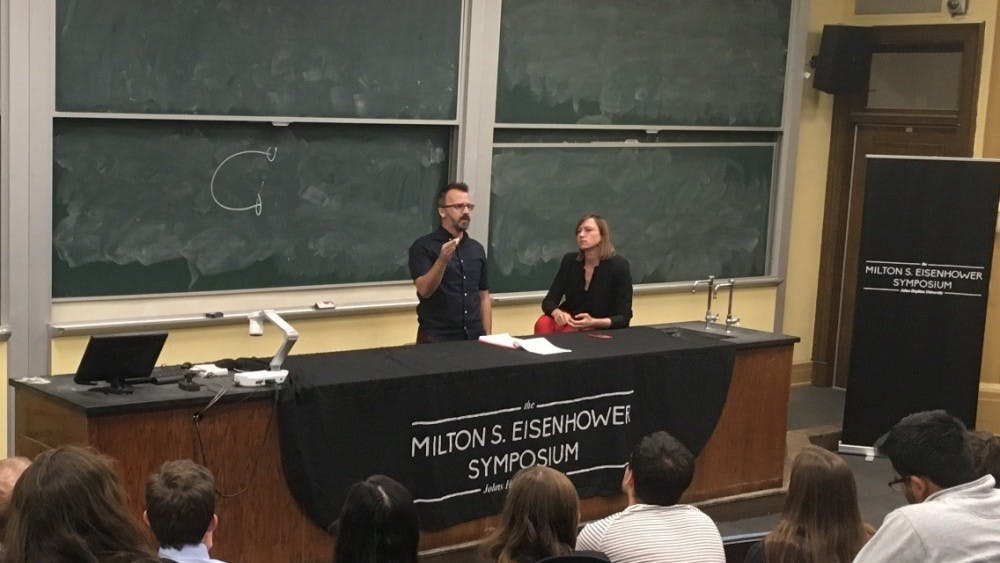George Ciccariello-Maher, a political activist and writer, discussed white supremacy and the American political system in his talk “Discourse in the Trump Age” on Wednesday as part of the Milton S. Eisenhower (MSE) Symposium speaker series. Some consider Ciccariello-Maher to be controversial for his radical views, including a tweet from 2016 which read, “All I want for Christmas is white genocide,” which Ciccariello-Maher has stated was satire.
Ciccariello-Maher justified his radical views by commenting on the American political divide.
“We live in a moment of radical polarization in which the political center is collapsing. There is a return of history in the form of polarization, populism and resurgent white supremacy,” he said.
Many students, however, were unsatisfied at how he handled the question and answer portion of the event. Sophomore Dave Taylor believes that Ciccariello-Maher was being evasive and refused to address the concerns of students who challenged him.
“He came here, and he was not entirely willing to accept the totality of other peoples’ questions. He was a bit manipulative — he tried to delegitimize questions,” Taylor said. “When he was actually pressed on how he felt we could make these institutional reforms that are necessary to bring about the change that he desires, he really had no concrete steps. I feel that he is more of a provocateur where there is perhaps more controversy than substance.”
Ciccariello-Maher explained progress cannot be achieved through discourse.
“The liberal response to far right is to recommend more civility. That we should be civil with those who want to kill and maim and destroy and send pipe bombs and murder Jews and murder migrants. We should be civil with them,” Ciccariello-Maher said. “We will not defeat white supremacy through politeness, through kindness, through civility. We will not defeat the enemies of humanity, through polite rational debate.”
Instead he proposed organizing movements of political struggle. The Black Lives Matter movement, according to Ciccariello-Maher, is an example of how change stems from the people and not the government.
“It is direct mobilization of movements in the streets that push on political institutions, on political leaders,” Ciccariello-Maher said.
He cited slavery and indigenous genocide as evidence that white supremacy is inherent in the political structure of the U.S. Currently, Ciccariello-Maher believes that white supremacy still exists in the U.S. — in police brutality, border patrol and the mass incarceration of minority groups. Ciccariello-Maher advocates for abolishing Immigration and Customs Enforcement (ICE), the police and border patrol.
“We need to organize in communities, organize self-defense for communities, organize defense against the police, make it physically impossible for these institutions to carry out their function. Only then will we be able to make our campuses, our communities, make our entire country and our society an unsafe space for white supremacy,” he said.
The floor then opened to discussion, with Assistant Sociology Professor Christy Thornton mediating the conversation. She appealed to Ciccariello-Maher’s expertise on Latin American politics by asking about parallels between the U.S. and Latin American countries. Ciccariello-Maher replied that the Venezuelan unrest of 1989 was effective in inciting the change that the people desired.
“The two existing parties — picture the Democrats and Republicans — basically disappeared, losing almost all authority because no one wanted them anymore, because everyone realized how corrupt they were,” Ciccariello-Maher said. “It was only then that politics could begin to change. Politics can only change with the eradication of existing parties.”
He elaborated that riots and rebellions helped to propel political consciousness and to transform the country. Movements and mobilizations, he emphasized, are the key to reform. But he insisted these don’t always have to be violent. Ciccariello-Maher cited Antifa, an anti-fascist left-wing militant group, as an example of nonviolent protest aimed at subverting police and border patrol objectives.
Antifa has used a number of different protest methods, including violence. Ciccariello-Maher explained that the organization also releases the identities of white supremacists, which disrupts their ability to organize and be accepted by their communities.
Ciccariello-Maher concluded his talk with how change ultimately derives from the people and that only the people can combat the resurgence of white supremacy.
“[It requires] mobilization in popular struggles, building huge movements of people, pushing back the far right, transforming the police, transforming mass incarceration, building a left consensus and moving the country in a similar direction,” he said.
Freshman Dylan Peters also found the lecture intellectually stimulating.
“He departed from common liberal viewpoints on how the whole liberal apparatus works in the U.S. and in the world at large,” Peters said. “I really liked his departure from common thought as a refreshing way to reanalyze the way we think about modern politics, the way our country is going, the way our global politics work.”
On the other hand, freshman Fabiana Corsi did not find Ciccariello-Maher’s perspective to be representative of mainstream news media or politically engaged constituents.
“The speaker represented some views that were very niche and tried to dress them up as views that represented a large segment of the country,” Corsi said. “In what I’ve seen as far as the news, as far as electoral results, as far as data, I don’t agree with it. I don’t think that represents the majority of the country or even the majority of the Democratic Party.”





